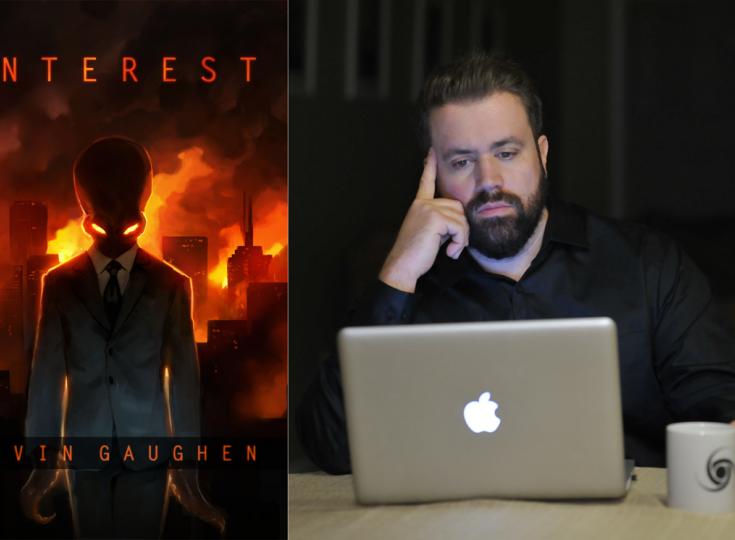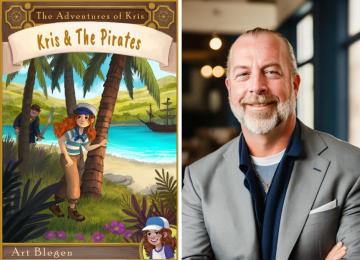Kevin Gaughen - Riveting Political Sci-fi Thrillers

When Kevin Gaughen isn't out doing night photography, Brazilian Jiu-Jitsu or engaging in pointless arguments on the Internet, he likes to write sci-fi. As our Author of the Day, Gaughen talks about aliens, politics and reveals how he keeps his readers at the edge of their seats.
Please give us a short introduction to what Interest is about.
Interest takes place during a period of armed uprising in the USA. Our protagonist, Len Savitz, is a journalist who is kidnapped by revolutionaries at war with the government. They send him on an investigative mission where he discovers some really disturbing secrets about humanity’s past. The insurrectionists use this information, which causes worldwide havoc.
Interest was written as a science fiction thriller, but it’s more of a satirical take on the state of the world. Underneath the story’s veneer, Interest is a commentary about who runs it the world and why it’s in the state it’s in.
Why political sci-fi? What drew you to the genre?
I’m not sure why my book is described as political science-fiction, because ALL science fiction is political! Heinlein, Le Guin, Bradbury, Herbert, Vonnegut: every work those authors produced was at least a little political. Science fiction writers imagine futuristic technology and faraway places, but that’s not what the genre is really about. Science fiction is a form of engineered culture shock; it's a way of getting us to see the human condition more clearly by placing it in unfamiliar circumstances.
Interest is probably a bit more political than usual because it deals with actual issues that are happening in the real world.
What inspired you to write against a backdrop where the White House has been bombed?
Because it doesn’t seem like an extremely far-fetched scenario.
I wrote interest in 2014, before the last election cycle had even started. Before our current president had even announced his candidacy. One of the subplots in the book is the Russians conspiring with the American far-right to usurp the government of the USA. Sound familiar? Four years later, there’s an investigation going on to see if that’s actually happening. I didn't have a crystal ball in 2014, I just watched the news. I saw the propaganda RT was putting out and it was clear to me, even back then, that they were trying to foment problems within the USA. They still are. But, then again, isn’t that exactly what we've done to them for decades? Politics doesn’t stop at borders.
Foreign influence aside, this massive, diverse country we live in has become highly polarized, hyper-partisan, and politically dysfunctional. Everyone wants to be right, the other side of the debate is dehumanized, and working together to solve problems is seen as weakness. There are already separatist movements forming that want to split states off from the union. It’s very easy to imagine a second civil war occurring within our lifetimes.
Your book poses the question: "Who really runs the world we live in?" Why was this theme important to you?
The book is titled Interest because one of its main focuses is debt. This theme is important because it’s something we as a species absolutely need to start thinking about. Why do we borrow money? What is money? Where does money come from? Who is benefitting from the arrangement we have now?
Besides writing, what other secret skills do you have?
Hah! I'm a halfway competent photographer. I love taking long-exposures pictures at night. You can see some of my work here: https://www.flickr.com/photos/frest0n/
Readers report that your book was a real page-turner. How did you manage to keep the pace throughout?
I have a philosophy about writing: if something is boring to write, it’ll be boring to read. A reader can feel the author’s enthusiasm through the page. So, if I’m writing a certain chapter and I’m not feeling too excited about it, I ask myself how it can be shortened or cut from the story. I try my best not to have any filler material or long, flowery descriptions about things no one cares about. I believe a book should have no boring parts. The plot should never stop moving.
Another important factor in making a book interesting is unpredictability. I can’t stand books where I know what’s going to happen ahead of time, so I do my best to keep my plots unpredictable.
I also think that maintaining tension and conflict throughout a story is absolutely crucial to keeping a reader’s attention.
People say this book screams to be made into a movie. Which actors would you like to see in the lead if this should happen?
Oh man, I have no idea. But I’d love to see lesser-known actors in the roles. I definitely think Neill Blomkamp should direct it!
Interest has a political theme, but it is hard to find a particular political bias in the story. How did you manage to keep it this unbiased?
Political beliefs are funny things. You would think that they’d come from a place of pragmatism, or from real-world experience, but they don’t. Most people’s political beliefs are a result of their feelings toward their parents and/or themselves. Our biases are rooted deep in our childhood, maybe even our genetics. We all want what’s best for humanity, but we fight about HOW to fix problems because we don’t all come from the same place, emotionally speaking. Politicians, the media, and marketing people understand this about us, even if we don’t understand it ourselves. They use emotional language to divide us, to inflame us, to motivate us. When you parse their words carefully, very little of what politicians say is factual or rational. We are puppets because we don’t realize that our feelings are constantly being manipulated.
Before I start writing, I try to step way back from my own emotional baggage. I try to separate the actual issue I’m studying from my feelings about it. When one removes emotion, one removes much of the bias. So, I look at humanity's problems the way I’d look at my lawn mower if it weren’t working. Many people are poor. Why? The world is violent. Why? Let’s figure this stuff out. Let’s see if we can solve it. This is the science side of it.
Once I feel like I understand something well enough, it’s time to start writing. At that point, I have to put the emotion back in, because emotionless writing sucks. The question then is: how do I passionately explain something to someone who might have beliefs at odds with what I’m saying? How can I put forward some new perspectives without triggering the reader to the point where they stop listening? This is the art side of it.
It’s really difficult!
Do you have any interesting writing habits? What is a typical writing day for you?
My wife hates my writing habits. Haha! I do my best work between 11 pm and 3 am. That’s when my brain seems to function best. I’m naturally nocturnal.
Also, I write in a way that would give other authors headaches. I map the entire novel out ahead of time, but then I write it entirely out of sequence. Each night, I pick the part of the story that seems most interesting to me at that moment, and I write that. So, I’ll write chapter 40 one night, then go back and write chapter 3 the next night. I do that so I’m always enthusiastic about whatever it is I’m writing because, as I’ve mentioned, readers pick up on that. When I’m done writing everything, I stitch it all together like a quilt and try to make it flow. It’s madness.
How do you force yourself to finish what you're doing before starting the next project when the new idea is nagging at you?
Follow-through is my only superpower. I can never remember where I left my car in the grocery store parking lot, but I can will myself into completing projects that take years. It helps to write all my ideas down as they come to me. Then, by the time I’m done with my current work, I’ll have a wealth of writing prompts for the next one and the overall idea will be more fully developed.
What are you working on right now?
Earlier this month, my second novel, Principal, was released. It’s the sequel to Interest. It took two and a half years to complete. The people who have read it so far seem to think that it’s an even better story than Interest, so that’s hopeful.
I’m also working on a third book, which is a collection of short sci-fi stories. The third book may take a few years to finish, due to the amount of research required.
Where can our readers discover more of your work or interact with you?
I’m on facebook, twitter, and goodreads. Drop me a line, I love hearing from my readers. Here are my links:
https://www.facebook.com/kevingaughenauthor/
https://twitter.com/gaughen
https://www.goodreads.com/author/show/13941575.Kevin_Gaughen






